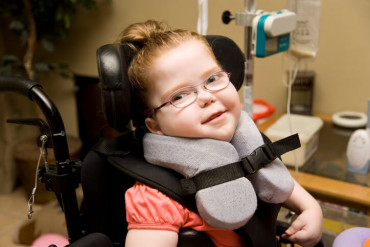What Can Parents Do When Their Infant is Diagnosed with Cerebral Palsy?

The birth of a new baby is exciting. Family and friends help celebrate the occasion with gender reveal parties and baby showers. The expectant parents spend months of anticipation making plans for the new baby’s future. Most parents have spent time attending infant care classes, setting up the nursery and preparing for maternity leave.
Unfortunately, sometimes not everything goes according to plan. Parents may be told that their child has cerebral palsy. Cerebral palsy, or CP, is a name for a wide spectrum of disorders that can affect muscle control, sensation, head control, walking, muscle tone, coordination and cognitive functioning.
When parents are told that their infant has cerebral palsy, they are faced with something they didn’t expect. In some ways, their entire world has changed. “Welcome to Holland” is a poem that one mom wrote many years ago after her child was born with a disability. She likened the experience of finding out her child had special needs to getting on an airplane and expecting to arrive in Italy, but instead, the airplane lands in Holland.
The author explains how she had specific expectations of her visit to Italy. The food, the weather and the culture in Holland were all different from what she had planned. It took her time to adjust, but eventually she was able to appreciate and enjoy Holland.
Many families aren’t sure what to do next after their child is diagnosed with CP. Finding a way to adjust to this new life is difficult. Here are a few ways to get started:
Get Connected. Most states have early intervention programs for infants through school-aged children. In Pennsylvania, Early Intervention Services are coordinated through the Department of Human Services. The staff there can connect families with children birth to age five, who have developmental delays and disabilities, like cerebral palsy, to services, supports and resources.
Find Support. Other families have been through a similar situation. There are non-profit organizations and support groups like UCP, Kids Together and PEAL that guide parents through this new world filled with medical terms, therapy appointments and medication. Often there are local conferences, workshops, group meetings and advocacy assistance available to families.
Ask questions. Once your child receives a diagnosis of cerebral palsy, you will be introduced to doctors, therapists and social workers. They will suggest medical tests, new medications, exercises and services. It will be overwhelming and difficult to take in all the information and advice offered. This is the time to ask questions – no matter how simple they may seem.
Start a notebook. Create a notebook to keep business cards and letters organized. Write down phone calls to and from medical staff and document conversations and appointments. Track pertinent information about your baby that medical staff or therapists may want to know. Write down your questions that can be asked at later appointments.
Become an Advocate. Your baby is counting on you to get them the best care available. Thinking ahead, asking the right questions and connecting to resources can help provide your child with the best life possible. Research what services are offered in your community and find out how your child can become eligible. You are an expert on your child and his or her development. Share information with medical staff, social workers and therapists. A diagnosis of cerebral palsy also comes with a financial burden. Develop a financial plan for medical equipment, home and vehicle modifications, health and future educational costs.
If you suspect that your child’s cerebral palsy was a result of a mistake made by medical or hospital staff, what should you do?
In many cases, a medical error occurred during the birth process that damaged specific areas of the child’s brain that control motor functions. If you suspect that your child’s cerebral palsy may have been caused by a medical error, you should contact Ross Feller Casey’s experienced cerebral palsy lawyers now for a free case evaluation.
Disclaimer: Ross Feller Casey, LLP provides legal advice only after an attorney-client relationship is formed. Our website is an introduction to the firm and does not create a relationship between our attorneys and clients. An attorney-client relationship is formed only after a written agreement is signed by the client and the firm. Because every case is unique, the description of awards and summary of cases successfully handled are not intended to imply or guarantee that same success in other cases. Ross Feller Casey, LLP represents catastrophically injured persons and their families in injury and wrongful death cases, providing legal representation in Pennsylvania and New Jersey.





